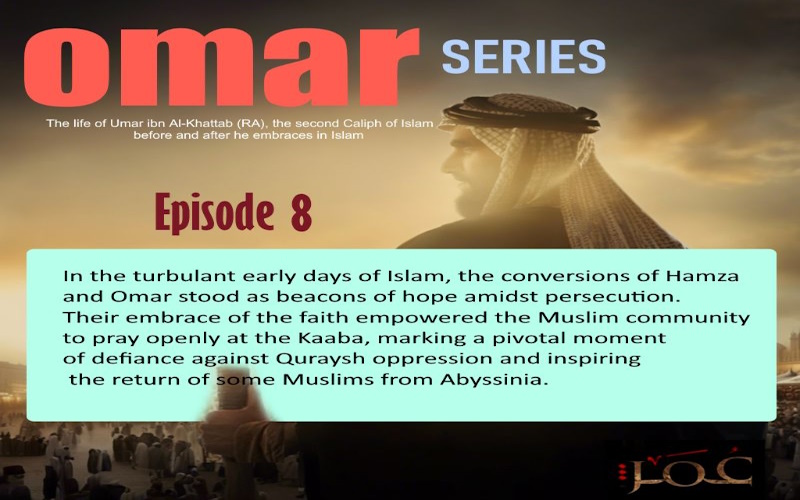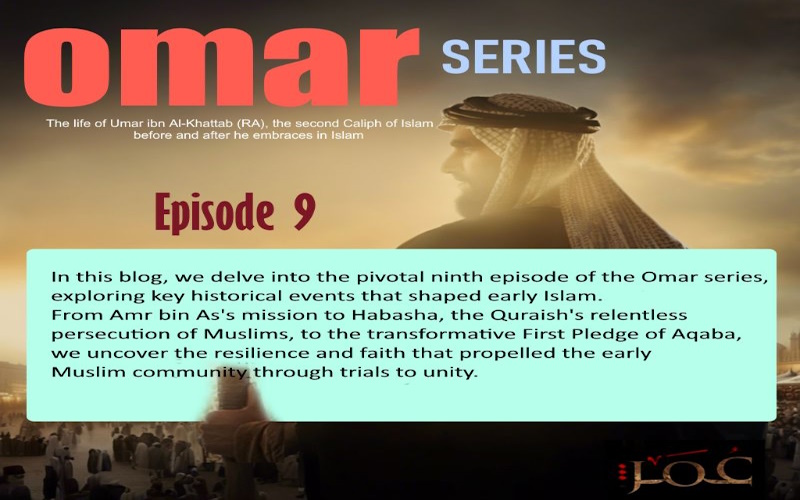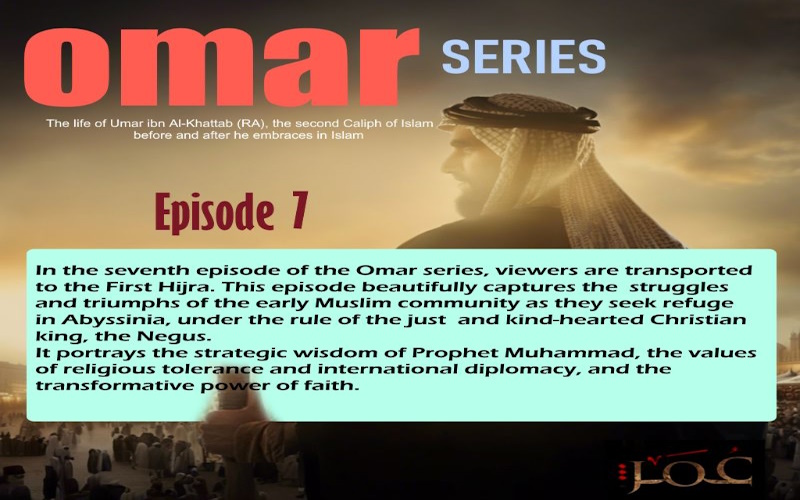This episode of Omar series continues with the complex dynamics of Meccan society. Prophet Mohammad and his followers are facing significant challenges due to his advocacy for monotheism and social equity.
Incident near Mount Safa and conversion of Hamza (R.A)
The resistance from the Quraysh tribe, particularly during an incident near Safa Hill, highlights the severe opposition he faced. During this event, Abu Jahl, led a brutal attack against Muhammad with some other polytheists like Adi ibn Hamra and Ibn al-Asada . This assault involved verbal abuses, physical violence, including an attack where Muhammad was forcibly restrained by the neck. Despite these provocations, Muhammad’s response was characterised by his inherent compassion, opting to withdraw peacefully to his residence.
This episode, however, did not escape the attention of Hamza, Muhammad’s paternal uncle, who was returning from hunting when he learned of his nephew’s ordeal from a freed female slave of Abdullah ibn Judan . Outraged by the disrespect shown towards Muhammad, Hamza confronted Abu Jahl at the Kaaba. In a bold act of defence, Hamza struck Abu Jahl with his bow, causing significant injury, and openly declared his conversion to Islam. This declaration was a crucial moment, signifying not just personal support for Muhammad but also marking a critical juncture in the early Islamic narrative.
Hamza’s conversion was instrumental in enhancing the morale of the early Muslim community and provided them with a significant protector against Quraysh hostilities. By publicly endorsing Muhammad and adopting Islam, Hamza showcased his deep loyalty and dedication, encouraging others within the community to remain steadfast.
The Transformation of Omar ibn Al-Khattab
The conversion of Omar ibn Al-Khattab (RA) to Islam stands as a pivotal moment in the annals of early Islamic history, significantly influencing the Muslim community’s trajectory in Mecca through his eminent status and fervent commitment to the Islamic cause.
Initially, Omar (RA) was vehemently against Islam and the Prophet Muhammad (PBUH), driven by the divisive impact Muhammad’s teachings were perceived to have on Meccan society. His intent to inflict harm upon the Prophet was rooted in this antagonism.
The turning point came through an encounter with Nu’aim ibn ‘Abdullah, which led Omar to reconsider his actions towards his family first. Arriving at his sister Fatima’s residence, he was confronted with the reality of his family’s conversion to Islam. Khabbab ibn Al-Aratt, who concealed himself upon Omar’s arrival was also in the house. The discovery of their faith and the altercation that followed, notably marked by his sister’s resilience and the visible wounds she sustained, prompted a profound shift in Omar’s perspective.
Compelled by his sister’s conviction, Omar cleansed himself and engaged with the verses from Surah Taha, experiencing a profound spiritual awakening that redirected his path.
The narrative also underscores the significance of the Prophet’s (PBUH) prayer for the strengthening of Islam through the conversion of either Omar ibn Al-Khattab or Amr ibn Hisham (Abu Jahl), with a noted preference for Omar. This invocation highlights the strategic and spiritual foresight of the Prophet (PBUH) in envisioning the transformative potential of Omar’s allegiance to Islam.
Upon embracing Islam at Dar Al-Arqam, Omar’s declaration of faith was met with immense jubilation among the early Muslim community, recognizing the substantial moral and strategic support his conversion provided. Omar’s subsequent actions, characterised by boldness in confronting Quraysh opposition and leveraging tribal affiliations for protection, exemplified his indomitable spirit and the immediate positive ramifications of his conversion on the Muslim community’s public expression of faith.
Omar’s conversion, therefore, not only marks a critical juncture in Islamic history but also exemplifies the transformative power of faith and the profound impact of individual journeys on collective destinies within the early Muslim community.
Impact of the conversion of Omar and Hamza in three days
The conversions of prominent figures like Hamza and Omar ibn Al-Khattab were pivotal moments in the early Muslim community’s struggle for acceptance and survival in Mecca. These high-profile conversions not only provided moral support and tribal protection but also signalled significant victories for Islam. While specific dialogues like the dramatised conversation between Khalid bin Walid and Amr Ibn Al-As regarding Omar’s conversion may not be historically documented, they symbolise the essence of these events. Omar’s conversion, characterised by his independent thought and commitment to truth over tribal loyalty, underscores the transformative power of personal conviction within the Muslim community. These narratives emphasise the profound impact of individual choices on collective destiny, highlighting themes of faith, resilience, and the courage to embrace new truths in Islamic history.
Muslims prayed openly in Kaaba
The depiction of Prophet Muhammad leading two columns into the mosque, one headed by Umar ibn Al-Khattab and the other by Hamza ibn Abdul-Muttalib, symbolizes a crucial phase in the early Islamic community’s development. This event, emblematic of the growing strength and confidence among Muslims in Mecca, represents a direct challenge to the Quraysh’s authority, the dominant tribe and principal opponents of the Muslims at the time. The involvement of Umar and Hamza, both highly respected and formidable individuals, in this public demonstration would have significantly intensified the Quraysh’s alarm, signaling a unified and determined front against the prevailing social and religious order.
Analyzing the Impact of Strategic Demonstrations
Strategic Significance: The strategic organization of this procession, with the Prophet Muhammad at the helm, flanked by key figures like Umar and Hamza, served multiple purposes. It was a clear assertion of the Muslim community’s resolve and unity, an open defiance against Quraysh’s persecution, and a demonstration of the shifting power dynamics within Meccan society.
Psychological Impact: The psychological impact on both the Muslims and their opponents cannot be understated. For the burgeoning Muslim community, this event was a morale booster, showcasing their leaders’ bravery and commitment. For the Quraysh and other Meccans, it was a stark indication that Islam was no longer a marginal sect but a formidable force that commanded respect and posed a significant challenge to the established order.
“Al-Farooq” and Umar’s Role in Islamic History
The conferment of the title “Al-Farooq” on Umar by the Prophet Muhammad is highly significant, marking Umar’s transformation and his crucial role within the Muslim community. This title, symbolizing Umar’s ability to distinguish between right and wrong, reflects not only his personal journey from an opponent to a defender of Islam but also his broader contributions to the Islamic faith, including:
Return to Mecca and the Case of Abdullah
The decision by some Muslims to return to Mecca from Abyssinia, motivated by news of positive developments, reflects the challenges and strategic decisions faced by the early Muslim community. Historical sources mention that some Muslims did return to Mecca from Abyssinia, either because they thought the persecution had lessened or for other personal reasons.
Abdullah, Sohail, and Abu Jandal: The story involving Abdullah, Sohail, and Abu Jandal is a dramatization that seems to blend elements from different historical narratives. For clarity:
Abu Jandal: He was the son of Suhail ibn Amr, a prominent Meccan who negotiated the Treaty of Hudaybiyyah with the Prophet Muhammad. Abu Jandal’s dramatic escape to the Muslim camp during the negotiations and his subsequent plea for asylum is a well-documented event.
Plot and Imprisonment: While the specific plot to lure Abdullah with a meeting and then imprison him is not a widely documented event, the themes of betrayal, familial opposition, and persecution are consistent with the broader challenges faced by early Muslims in Mecca.






